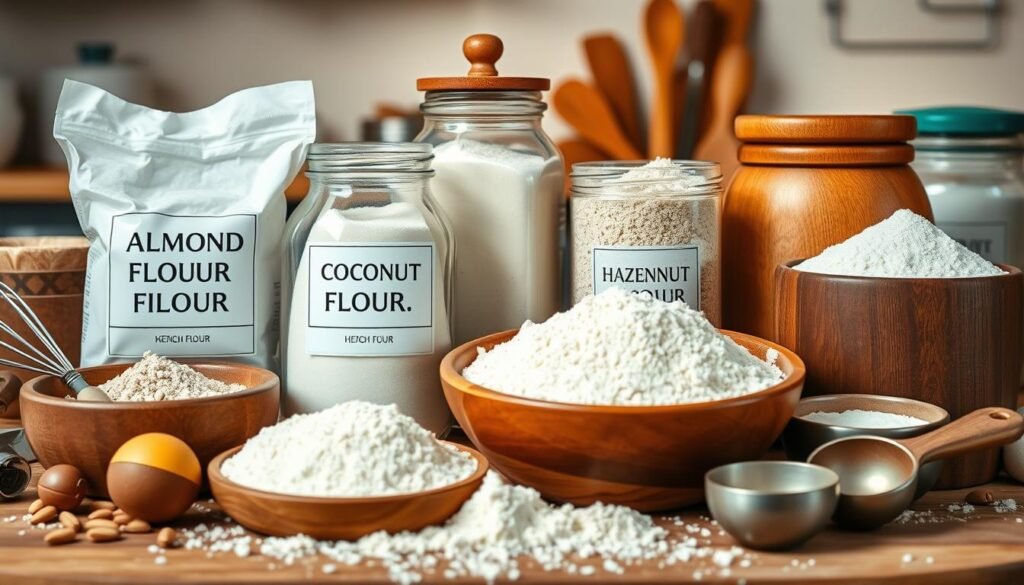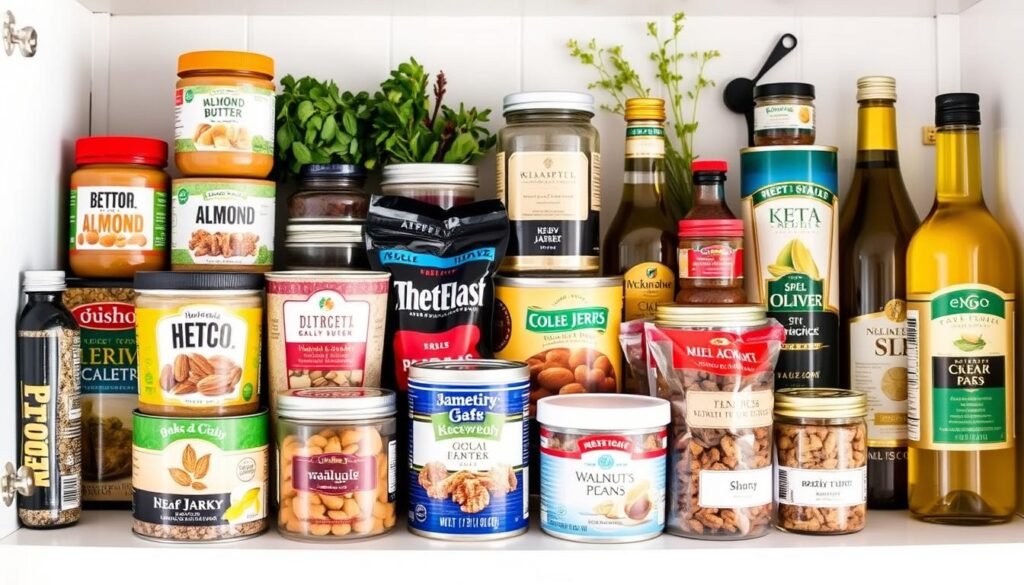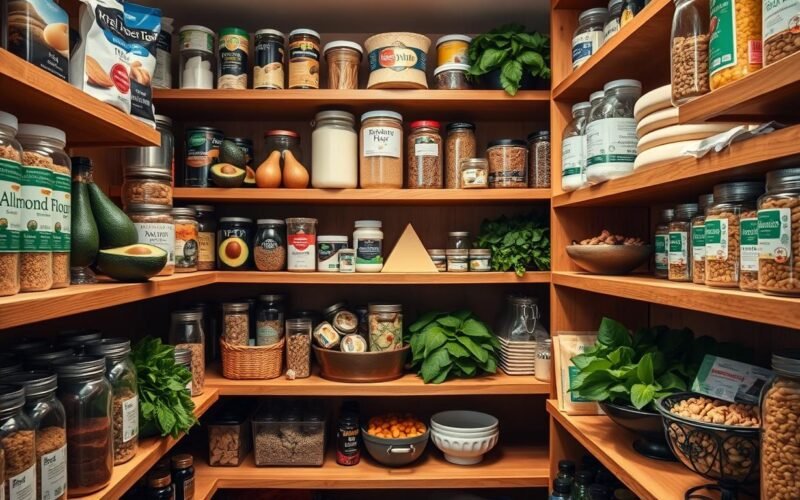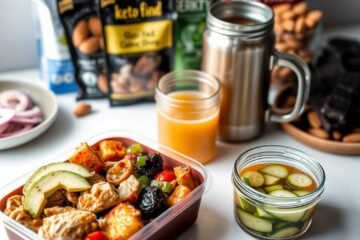Starting a keto lifestyle needs careful planning. A well-stocked keto-friendly foods in your pantry is key for easy meals and snacks. It keeps you in ketosis.
You’ll need healthy fats, low-carb flours, sugar alternatives, and protein sources. These items are the heart of a fat-adaptation journey.
Learn the basics in our How to start a keto diet – begnirer’s guide.
Key Takeaways
- Make a pantry with healthy fats, low-carb flours, and sugar alternatives for a keto lifestyle.
- Keep canned fish, eggs, and meat for a steady protein source.
- Add spinach, avocados, and broccoli for a balanced keto diet.
- Try keto-friendly condiments, spices, and snacks for flavor and variety.
- Choose quality over quantity in your keto-friendly foods.
Keto Grocery List (Beginner Essentials)
Proteins
Eggs; chicken thighs/breasts; ground beef (80/20); steak; pork chops; bacon; turkey; deli meats (no sugar)
Seafood
Salmon fillets; tuna (cans); sardines; shrimp; cod/white fish
Fats & Oils
Olive oil; avocado oil; butter; ghee; coconut oil; MCT oil (optional)
Low-Carb Vegetables
Spinach; lettuce/greens; zucchini; cauliflower (or riced); broccoli; asparagus; bell peppers; cucumber; mushrooms
Dairy & Alternatives
Cheese (cheddar/mozzarella); cream cheese; heavy cream; unsweetened Greek yogurt; unsweetened almond milk; unsweetened coconut milk
Nuts & Seeds
Almonds; walnuts; pecans; macadamia nuts; chia; flaxseed; hemp hearts
Pantry & Baking
Almond flour; coconut flour; psyllium husk; cocoa powder (unsweetened); sugar-free mayo; pickles/olives; bone broth
Condiments
Mustard; hot sauce; soy sauce/tamari; coconut aminos; pesto; apple cider vinegar
Sweeteners (keto-friendly)
Stevia; erythritol; monk fruit; allulose
Beverages
Water/sparkling water; coffee; tea; electrolyte mix (no sugar)
Spices & Herbs
Sea salt; black pepper; garlic & onion powder; paprika; cumin; Italian seasoning; cinnamon
Quick tips:
- Net carbs = Total carbs − fiber. Aim for ≤20–30 g net carbs/day to start.
- Avoid: sugar, bread/pasta/rice, potatoes, most fruit (except small portions of berries), sweetened yogurt, juice/soda, and products with maltodextrin or hidden sugars.
Essential Fats and Oils for Your Keto Kitchen
Healthy fats and oils are key on a ketogenic diet. They help with cooking, baking, and adding flavor. They also support weight loss and keep you full of energy.
Best Cooking Oils for Keto Success
Not all oils are good for keto. Avoid seed oils like vegetable and soybean oil. Choose oils that are good for you instead.
- Extra virgin olive oil: Great for sautéing and dressings.
- Avocado oil: Best for grilling and stir-frying.
- Coconut oil: Adds flavor and works well at medium heat.
- Grass-fed butter and ghee: Adds creaminess and works at high heat.
- MCT oil: Boosts metabolism and ketone production.
Healthy Fat Sources for Meal Preparation
There are many healthy fats for keto-friendly meals. Some include:
- Nuts and seeds (e.g., almonds, walnuts, chia, flax)
- Avocados and avocado oil
- Fatty fish (e.g., salmon, mackerel, sardines)
- Egg yolks
- Grass-fed meat and poultry
- Coconut and MCT oil
Storage Tips for Oils and Fats
Keep your keto oils and fats fresh. Store them in cool, dark places. Refrigerate items like grass-fed butter and MCT oil. This keeps them good for longer.
“Incorporating the right fats and oils into your keto lifestyle is essential for weight loss, metabolic health, and sustained energy.”
Low-Carb Flours and Baking Essentials
Starting a keto lifestyle means changing how you bake. There are many low-carb flours for bread, cakes, and treats. Almond flour and coconut flour are great for tasty keto baking.
Some key ingredients make keto baking better. Psyllium husk powder helps with texture. Xanthan gum makes things thicker like gluten. With these, you can make lots of intermittent fasting-friendly treats.
Exploring the Carb Counts of Keto Flours
For keto flours, knowing the carb count is important. Here’s what some popular ones have:
- Almond flour: 3g total carbs, 1g net carbs per 2-tablespoon serving
- Coconut flour: 9g total carbs, 4g net carbs per 2-tablespoon serving
- Chia flour: 5g total carbs, 0g net carbs per 2-tablespoon serving
- Flaxseed meal: 4g total carbs, 0g net carbs per 2-tablespoon serving
Knowing the carbs in these flours lets you mix them for the best taste and texture in keto baking.

Unlocking the Potential of Keto Baking Essentials
There are more ingredients to make keto baking even better. Psyllium husk powder makes breads and muffins crumbly. Xanthan gum thickens like gluten. These help you make lots of tasty intermittent fasting treats.
“Experimenting with different flour combinations is key to achieving the perfect texture and flavor in your keto baked goods.”
Complete Guide to Keto Pantry Proteins
When you’re on a ketogenic diet, it’s key to get enough protein. Luckily, there are many protein-rich foods you can keep in your pantry. Canned tuna, salmon, beef jerky, and pork rinds are all great choices. They make it easy to stick to your keto diet.
Shelf-Stable Protein Options
Keep canned tuna, salmon, and chicken for quick, protein-rich meals. Beef jerky and pork rinds are also good for a protein boost. Powdered collagen or whey protein supplements are great for adding protein to your diet.
Protein Powders and Supplements
Protein powders like grass-fed whey or plant-based options are easy to add to shakes and smoothies. They help you meet your protein needs and keep your muscles strong while on a ketogenic diet.
Emergency Protein Sources
It’s smart to have some emergency protein sources in your pantry. Shelf-stable bone broth and protein bars can give you a quick protein fix. They help you stay on track with your weight loss and metabolic health goals.
Having a variety of keto-friendly foods which contains proteins in your pantry is a smart move. It helps you stay on your ketogenic path and keeps your body healthy.
Make shopping easier with this Keto Grocery Essentials list and discover low-carb vegetables that keep you in ketosis.

Smart Sugar Alternatives and Sweeteners
Finding the right sugar substitutes is key on the keto diet. You want to satisfy your sweet cravings without losing your low-carb goals. Luckily, there are many keto-friendly sweeteners for baking, drinks, and desserts.
Erythritol is a natural sugar alcohol that’s 70% as sweet as regular sugar but has fewer carbs. Monk fruit extract is 100-250 times sweeter than sugar. This means you only need a little to get the flavor you want.
Stevia is a plant-based sweetener that’s 30-150 times sweeter than sugar. It has zero calories and carbs. If you prefer artificial sweeteners, aspartame and sucralose are good choices. Acesulfame K and saccharin are also options for sweetening without carbs.
These smart sugar alternatives are great for baking treats or sweetening your coffee. They help you stay in ketosis while still enjoying sweet things. Try out different options to find what works best for you.
For cold weather and emergency prep, don’t miss this guide:
keto pantry staples for winter (no-fridge).
FAQ
What are the essential keto pantry staples?
What are the key keto fats and how should they be stored?
What are the essential low-carb flours and baking staples for keto?
What are the best protein sources for a keto pantry?
What are the best keto-friendly sweeteners?

I’ve followed a low-carb and ketogenic lifestyle for over five years, gaining hands-on experience with what is practical, sustainable, and realistic in daily life. My work is informed by continuous self-education through reputable nutrition research and publicly available medical literature.
Read more about the founder →



